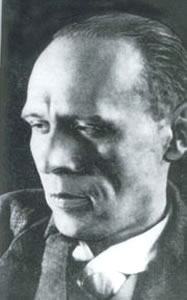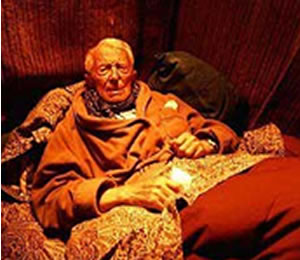De Amerikaanse schrijver, dichter en componist Paul Bowles werd geboren in New York op 30 december 1910. Zie ook mijn blog van 30 december 2006 en ook mijn blog van 30 december 2007.
Uit: The Stories of Paul Bowles
„The melting snow dripped from the balconies. People hurried through the little street that always smelled of frying fish. Now and then a stork swooped low, dragging his sticklike legs below him. The small gramophones scraped day and night behind the walls of the shop where young Amar worked and lived. There were few spots in the city where the snow was ever cleared away, and this was not one of them. So it gathered all through the winter months, piling up in front of the shop doors.
But now it was late winter; the sun was warmer. Spring was on the way, to confuse the heart and melt the snow. Amar, being alone in the world, decided it was time to visit a neighboring city where his father had once told him some cousins lived.
Early in the morning he went to the bus station. It was still dark, and the empty bus came in while he was drinking hot coffee. The road wound through the mountains all the way.
When he arrived in the other city it was already dark. Here the snow was even deeper in the streets, and it was colder. Because he had not wanted to, Amar had not foreseen this, and it annoyed him to be forced to wrap his burnous closely about him as he left the bus station. It was an unfriendly town; he could tell that immediately. Men walked with their heads bent forward, and if they brushed against a passer-by they did not so much as look up. Excepting the principal street, which had an arclight every few meters, there seemed to be no other illumination, and the alleys that led off on either side lay in utter blackness; the white-clad figures that turned into them disappeared straightway.
“A bad town,” said Amar under his breath. He felt proud to be coming from a better and larger city, but his pleasure was mingled with anxiety about the night to be passed in this inimical place. He abandoned the idea of trying to find his cousins before morning, and set about looking for a fondouk or a bath where he might sleep until daybreak.
Only a short distance ahead the street-lighting system terminated. Beyond, the street appeared to descend sharply and lose itself in darkness. The snow was uniformly deep here, and not cleared away in patches as it had been nearer the bus station. He puckered his lips and blew his breath ahead of him in little clouds of steam. As he passed over into the unlighted district he heard a few languid notes being strummed on an oud. The music came from a doorway on his left. He paused and listened. Someone approached the doorway from the other direction and inquired, apparently of the man with the oud, if it was “too late.”
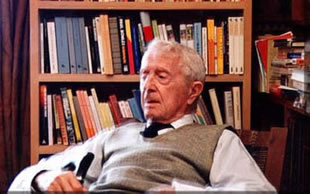
Paul Bowles (30 december 1910 – 18 november 1999)
De Britse schrijver en dichter Joseph Rudyard Kipling werd geboren op 30 december 1865 in Bombay, India. Zie ook mijn blog van 30 december 2006 en ook mijn blog van 30 december 2007.
Uit: The Light That Failed
„The children had discovered that their lives would be unendurable without pistol-practice. After much forethought and self-denial, Dick had saved seven shillings and sixpence, the price of a badly constructed Belgian revolver. Maisie could only contribute half a crown to the syndicate for the purchase of a hundred cartridges. ‘You can save better than I can, Dick,’ she explained; ‘I like nice things to eat, and it doesn’t matter to you. Besides, boys ought to do these things.’
Dick grumbled a little at the arrangement, but went out and made the purchase, which the children were then on their way to test. Revolvers did not lie in the scheme of their daily life as decreed for them by the guardian who was incorrectly supposed to stand in the place of a mother to these two orphans. Dick had been under her care for six years, during which time she had made her profit of the allowances supposed to be expended on his clothes, and, partly through thoughtlessness, partly through a natural desire to pain,–she was a widow of some years anxious to marry again,–had made his days burdensome on his young shoulders.
Where he had looked for love, she gave him first aversion and then hate.
Where he growing older had sought a little sympathy, she gave him ridicule. The many hours that she could spare from the ordering of her small house she devoted to what she called the home-training of Dick Heldar. Her religion, manufactured in the main by her own intelligence and a keen study of the Scriptures, was an aid to her in this matter. At such times as she herself was not personally displeased with Dick, she left him to understand that he had a heavy account to settle with his Creator; wherefore Dick learned to loathe his God as intensely as he loathed Mrs. Jennett; and this is not a wholesome frame of mind for the young. Since she chose to regard him as a hopeless liar, but an economical and self-contained one, never throwing away the least unnecessary fib, and never hesitating at the blackest, were it only plausible, that might make his life a little easier. The treatment taught him at least the power of living alone,–a power that was of service to him when he went to a public school and the boys laughed at his clothes, which were poor in quality and much mended. In the holidays he returned to the teachings of Mrs. Jennett, and, that the chain of discipline might not be weakened by association with the world, was generally beaten, on one account or another, before he had been twelve hours under her roof.“
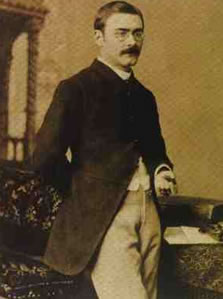
Rudyard Kipling (30 december 1865 –18 januari 1936)
De Duitse schrijver Theodor Fontane werd geboren in Neuruppin op 30 de
cember 1819. Fontanes ouders waren hugenoten, die vanuit Zuid-Frankrijk waren overgekomen en in Neuruppin een apotheek hadden geopend. Daar, en eveneens in Swinemünde, bracht Fontane zijn jeugd door. Hij beëindigde de school vroegtijdig om in Leipzig en later Berlijn als apothekersleerling te werken. In Berlijn kwam hij in 1842 met Georg Herwegh in contact; zijn eerste gedichten waren geïnspireerd door de Vormärz. Zijn eerste successen kwamen echter als lid van het collectief Tunnel über der Spree: de Preußenlieder waren ballades over verdienstelijke figuren. In 1850 huwde hij; hij maakte een aantal reizen naar Engeland. Na zijn terugkeer wierf de Pruisische staat hem als journalist aan; hij werd in 1860 redacteur bij de Kreuzzeitung, een conservatieve krant. Hij werd populair met een reeks verhalen over de streek, die in episoden gepubliceerd werden: de Wanderungen durch die Mark Brandenburg, waarbij hij historische anekdotes over de regio in zeer groot detail beschreef. De Wanderungen bleven van 1862 tot 1882 bestaan. Hij realiseerde zich dat Pruisen in feite nog geen boekcultuur van grote maatschappelijke romans bezat en begon ze dus zelf te schrijven. In totaal schreef hij op late leeftijd nog 16 romans; enerzijds misdaadverhalen, anderzijds burgerlijke familiegeschiedenissen waarvoor hij naar stof uit de Wanderungen teruggreep. Zijn romans luidden het naturalisme in; in zijn theaterrecensies gaf hij zijn goedkeuring aan de nieuwe generatie dramatici, zoals Gerhart Hauptmann.
Uit: Effie Briest
„Solche Karten trafen nun täglich ein, aus Innsbruck, aus Verona, aus Vicenza, aus Padua, eine jede fing an: »Wir haben heute vormittag die hiesige berühmte Galerie besucht«, oder wenn es nicht die Galerie war, so war es eine Arena oder irgendeine Kirche »Santa Maria« mit einem Zunamen. Aus Padua kam, zugleich mit der Karte, noch ein wirklicher Brief. »Gestern waren wir in Vicenza. Vicenza muß man sehen wegen des Palladio; Geert sagte mir, daß in ihm alles Moderne wurzele. Natürlich nur in bezug auf Baukunst. Hier in Padua (wo wir heute früh ankamen) sprach er im Hotelwagen etliche Male vor sich hin: ‘Er liegt in Padua begraben’, und war überrascht, als er von mir vernahm, daß ich diese Worte noch nie gehört hätte. Schließlich aber sagte er, es sei eigentlich ganz gut und ein Vorzug, daß ich nichts davon wüßte. Er ist überhaupt sehr gerecht. Und vor allem ist er engelsgut gegen mich und gar nicht überheblich und auch gar nicht alt. Ich habe noch immer das Ziehen in den Füßen, und das Nachschlagen und das lange Stehen vor den Bildern strengt mich an. Aber es muß ja sein. Ich freue mich sehr auf Venedig. Da bleiben wir fünf Tage, ja vielleicht eine ganze Woche. Geert hat mir schon von den Tauben auf dem Markusplatz vorgeschwärmt, und daß man sich da Tüten mit Erbsen kauft und dann die schönen Tiere damit füttert. Es soll Bilder geben, die das darstellen, schöne blonde Mädchen, ‘ein Typus wie Hulda’, sagte er. Wobei mir denn auch die Jahnkeschen Mädchen einfallen. Ach, ich gäbe was drum, wenn ich mit ihnen auf unserem Hof auf einer Wagendeichsel sitzen und unsere Tauben füttern könnte. Die Pfauentaube mit dem starken Kropf dürft ihr aber nicht schlachten, die will ich noch wiedersehen. Ach, es ist so schön hier. Es soll auch das Schönste sein. Eure glückliche, aber etwas müde Effi.«
Frau von Briest, als sie den Brief vorgelesen hatte, sagte:
»Das arme Kind. Sie hat Sehnsucht.«
»Ja«, sagte Briest, »sie hat Sehnsucht. Diese verwünschte Reiserei …«
»Warum sagst du das jetzt? Du hättest es ja hindern können. Aber das ist so deine Art, hinterher den Weisen zu spielen. Wenn das Kind in den Brunnen gefallen ist, decken die Ratsherren den Brunnen zu.«
»Ach, Luise, komme mir doch nicht mit solchen Geschichten. Effi ist unser Kind, aber seit dem 3. Oktober ist sie Baronin Innstetten. Und wenn ihr Mann, unser Herr Schwiegersohn, eine Hochzeitsreise machen und bei der Gelegenheit jede Galerie neu katalogisieren will, so kann ich ihn daran nicht hindern. Das ist eben das, was man sich verheiraten nennt.«
»Also jetzt gibst du das zu. Mir gegenüber hast du’s immer bestritten, immer bestritten, daß die Frau in einer Zwangslage sei.«
»Ja, Luise, das hab ich. Aber wozu das jetzt. Das ist wirklich ein zu weites Feld.«

Theodor Fontane (30 december 1819 – 20 september 1898)
De Amerikaanse dichter, schrijver en criticus Joshua Clover werd geboren op 30 december 1962 in Berkeley, California. Hij studeerde aan de Boston University en nam deel aan de Iowa Writer’s Workshop. Hij doceert English Literature and Critical Theory aan de University of California. Clover schrijft ook regelmatig bijdragen voor de Village Voice, The New York Times en het magazine Spin.
The map room
We moved into a house with 6 rooms: the Bedroom,
the Map Room, the Vegas Room, Cities
in the Flood Plains, the West, & the Room Which Contains All
of Mexico. We honeymooned in the Vegas Room where
lounge acts wasted our precious time. Then there was the junta’s
high command, sick dogs of the Map Room, heel-
prints everywhere, pushing model armies into the unfurnished
West. At night: stories of their abandoned homes in the Cities
in the Flood Plains, how they had loved each other
mercilessly, in rusting cars, until the drive-in went under.
From the Bedroom we called the decorator & demanded
a figurehead… the one true diva to be had
in All of Mexico: Maria Felix [star of The Devourer, star
of The Lady General]. Nightly in Vegas, “It’s Not Unusual”
or the Sex Pistols medley. Nothing ever comes back
from the West, it’s a one-way door, a one-shot deal,–
the one room we never slept in together. My wife
wants to rename it The Ugly Truth. I love my wife for her
wonderful, light, creamy, highly reflective skin;
if there’s an illumination from the submerged Cities,
that’s her. She suspects me of certain acts involving Maria Felix,
the gambling debts mount…but when she sends the junta off to Bed
we rendezvous in the Map Room & sprawl across the New World
with our heads to the West. I sing her romantic melodies from the Room
Which Contains All of Mexico, tunes which keep arriving
like heaven, in waves of raw data, & though I wrote
none of the songs myself & can’t pronounce them, these are my
greatest hits

Joshua Clover (Berkeley, 30 december 1962)
De Vlaamse dichter en schrijver Willy Spillebeen werd geboren in Westrozebeke op 30 december 1932. Zie ook mijn blog van 30 december 2006 en ook mijn blog van 30 december 2007.
Geen ploeg staat stil
Geen ploeg staat stil
voor een mens die sterft.
Al snuift het paard
de pulpen geur
van aardappelloof en grond.
Al staart de man
soms vragend om
een vogel volgend
die naar zee vliegt.
Hij heeft geen spiegel
bij de hand
maar hij wéét het wel
onder zijn vel
staat de doodskop kil.
Het paard in gerinkel
van bellen stapt voort
en de man gaat weerbarstig
achterna
– moeders gezicht
was verschrikkelijk wit
als licht in water –
Maar dra bestaan licht
en water niet meer.
Ik kijk blind en omvat
met vingers van brandhout
het houten handvat.
Ju mijn paard.

Willy Spillebeen (Westrozebeke, 30 december 1932)
De Russische dichter en schrijver Daniil Charms (pseudoniem van Daniil Ivanovitsj Joevatsjov) werd geboren in Sint-Petersburg op 30 december 1905.
Ich weiß warum die Wege
Ich weiß warum die Wege
wenn sie sich losreißen von der Erde
mit den Vögeln spielen.
Mir ist bestens bekannt
wohin der Soldat stirbt
wenn er sein letztes Wort gerufen hat.
Die Bleiknöpfe seines Mantels
werden Zeichen
für das was neu sich vor ihm auftut.
Ein zartes Ästchen Wind
bläst in sein Grab.
Mit riesigen Schwüngen der Rippen
fängt der Soldat die Lufträder ein
die das Blut kreisen lassen zur Verlängerung des Lebens.
Nicht schwer ist auszurechnen
wie oft in der Minute das Herz schlägt des Feindes und des Kriegers.
Ferner sei euch das Mittel entdeckt
zur Erforschung der Himmelsbalkone
in denen das Pendel der sechsten Zeit
irdische Grüße versteckt.
Ich will euch den Weg der Rettung weisen.
Uit: Traktat mehr oder weniger nach der Lektüre Emersons
1. Über Geschenke
Unvollkommene Geschenke sind solche Geschenke: zum Beispiel: wir schenken jemandem zum Namenstag den Deckel eines Tintenfasses. Und wo ist das Tintenfaß selbst? Oder wir schenken ihm ein Tintenfaß mit Deckel. Und wo ist der Tisch, auf dem das Tintenfaß stehen sollte? Wenn der Beschenkte schon einen Tisch hat, so wird das Tintenfaß zum vollkommenen Geschenk. Stets vollkommene Geschenke sind Schmuckstücke für den nackten Körper, wie zum Beispiel Ringe, Armreifen, Colliers usw. (vorausgesetzt natürlich, der Beschenkte ist kein Krüppel), oder Geschenke wie, zum Beispiel, ein Stäbchen, an dessem einem Ende eine kleine Holzkugel befestigt ist, am anderen Ende dagegen ein hölzerner Würfel. Ein solches Stäbchen kann man in Händen halten oder, wenn man es weglegt, dann ist vollkommen gleichgültig
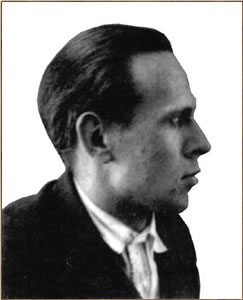
Daniil Charms (30 december 1905 – 2 februari 1942)
De Duitse schrijver en regisseur Peter Lund werd geboren op 30 december 1965 in Flensburg. Na het gymnasium studeerde hij architectuur in Berlijn. In 1987 met het schrijven en regiseren van eigen theaterstukken. In de periode 1996 – 2004 had hij de leiding over de Neuköllner Oper. Zowel als regisseur als als schrijver heeft Lund een voorliefde voor de musical. Hierbij schrikt hij er echter niet voor terug om actuele thema’s als terrorisme ((„Held Müller“) op het toneel te brengen.
Uit: ELTERNABEND
1. Szene (Ausschnitt)
Ein Schülerladen. Zu kleine Tische, zu kleine Stühle, eine Kuschelecke mit
überdimensionalen, angeschmuddelten Stofftieren. Eine Ecke mit Musikinstrumenten und
Rhythmusgeräten. Spielzeug nach Belieben, Kinderbilder, etc.
Irene, eine etwas abgekämpfte Mitdreißigerin, die sich um ihr Äußeres bewußt wenig
kümmert, allein auf der Bühne. Sie arrangiert ein kümmerliches Buffet.
Irene: ruft nach hinten
Und- nervös?
Dennis: off
Nein. Warum?
Irene:
Mußt du nicht sein.
Irene klaut ein Partywürstchen. Dennis, der neue Erzieher, ein sympathischer, etwas
langweilig wirkender großer Junge um die dreißig kommt mit Fladenbrot aus der Küche.
Irene mit vollem Mund
Wir fressen keinen.
Dennis:
Ich hab doch gerade hier zwei Flaschen Wasser hingestellt?
Irene:
Hab ich noch mal in die Küche gebracht. Damit es nicht zu warm wird.
Dennis:
Wie viele kommen denn normalerweise zu so was?
Irene:
Ich kann’s auch wieder hinstellen.
Dennis:
Nicht nötig. Mehr als zehn?
Irene:
Also, ich bin da!
Dennis:
Doch nicht mehr als zehn, oder?
Irene:
Soll ich‘s wieder hinstellen?
Dennis:
Echt nicht nötig.
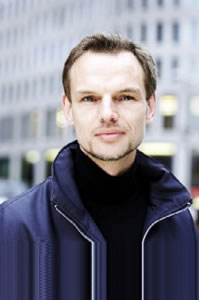
Peter Lund (Flensburg, 30 december 1965)
De Canadese schrijver Douglas Coupland werd geboren op 30 december 1961 in een militaire kazerne in Rheinmünster-Söllingen in Duitsland. Op zijn vierde keerde zijn familie terug naar Vancouver in Canada, waar hij verder opgroeide. In 1979 haalde Coupland zijn diploma op de Sentinel Secondary School in West Vancouver. In 1984 studeerde hij af aan de Emily Carr College of Art and Design in Vancouver, waarna hij naar Hawaii reisde, het Europese Design Instituut in Milaan en naar het Hokkaido College of Art and Design in Sapporo in Japan. Hij genoot succes als beeldhouwer en had een tentoonstelling in Vancouver, getiteld ‘The Floating World’. Hij kreeg een baan als schrijver bij een nieuwsblad. Coupland verwierf bekendheid als schrijver met zijn roman ‘Generation X’ in 1991. Zijn interesse in ‘Generation X’ bleek al toen hij in 1988 een artikel voor de Vancouver Magazine er over schreef. Hij continueerde het project, aanvankelijk als strip met striptekenaar Paul Leroche, maar toen hem werd verzocht er een handboek over te schrijven, maakte hij er een boek van. Nadien werd hij gezien als de woordvoerder voor zijn generatie, iets wat hij altijd verwierp. Hij sprak voor zichzelf, niet voor een generatie.
Uit: Life After God
„It was years ago. I had been going through a patch of intense brooding and had made a big hubbub about severing most of my ties to my past. I had moved into a rent-by-the-week cold water downtown hotel room on Granville Street and had cut my hair off, stopped shaving, and had thorns tatooed on my right arm. I spend my days lying on my bed staring at the ceiling, listening to the drunked brawls in other rooms, the squawk of other TVs and the smashing of other mirrors. My fellow tenants were a mixture of pensioners, runaways, drug dealers and so forth. The whole ensemble had made a suitable glamourous backdrop for my belief that my poverty, my fear of death, my sexual frustration, and my inability to connect with others would carry me off into some sort of Epiphany. I had lots of love to give — it’s just that no one was taking it then. I had thought I was finding consolation in solitude, but to be honest I think I was only acquiring a veneer of bitterness.
My neighbors across the hall at this time were a headbanger couple. Cathy and Pup-Tent. Cathy was a seventeen-year-old runaway from Kamloops up north; Pup-Tent was a bit older and from back East. They both had the ghostly complexions, big hair and black leather wardrobe that heavy metal people like so much. They tended to live at night and sleep late into the afternoon, but sometimes I would see Pup-Tent being the very picture of enterprise down on Granville Street, selling hash cut with Tender Vittles to treeplanters on city leave. Or I would see Cathy, selling feather earrings in the rain on Robson Street. Sometimes I would see them both at the corner grocery store where they would be shopping for Kraft dinner, grenadine syrup, peeled carrot sticks, Cap’n Crunch, After Eight dinner mints and Lectric Shave. We would nod in a neighborly way and occasionally we would meet in the pub at the Yale Hotel where we would get to talking, and it was via these encounters that I got to know them. They would sit there drawing skulls and crossbones on each other’s transdermal nicotine patches and drink draft beers.“

Douglas Coupland (Rheinmünster-Söllingen, 30 december 1961)
De Duitse dichter, schrijver en schilder Georg von der Vring werd geboren op 30 december 1889 in Brake (Oldenburg). Hij volgde van 1904 tot 1910 de lerarenopleiding in Oldenburg en leerde daar de jonge (latere uitgever) Peter Suhrkamp kennen. Nog tijdens zijn opleiding publiceerde hij in eigen beheer zijn eerste gedichtenbundel Muscheln. Na het succes van zijn roman „Soldat Suhren”, die bekend staat als de eerste literaire verwerking van WO I in de Duitse literatuur, verstigde hij zich als zelfstandig schrijver en schilder in Tessin, Wenen, en vanaf 1930 in Stuttgart.
Nie genug
Bei meines Lebens Narretein
Da ward ich einmal klug,
Ich liebt’ mich in dein Herz hinein,
Und tat’s doch nie genug.
Dein Mund so schön, dein Auge klar,
War alles, was ich frug,
Bis daß ich gar verwandelt war,
Und war’s doch nie genug.
Du wurdest unsre Mutter dann,
Die meine Kinder trug,
Ich saß bei dir und sah dich an,
Und tat’s doch nie genug.
Und als das Unheil lauerte,
Und als der Tod dich schlug,
Da weint’ ich hin und trauerte,
Und tat’s doch nie genug.
Wie dank ich’s dir? Das Leben hier
Ist eines Vogels Flug.
Was ich noch bringe, bring ich dir,
Doch nie und nie genug.
Schwarz
Nacht ohne dich.
Wer wird mein Herz bewahren?
Der Mond erblich.
Die Vogelwolken fahren.
Vorüberstrich
Ein Schwarm von schwarzen Jahren.

Georg von der Vring (30 december 1889 – 1 maart 1968)
De Franse dichter en schrijver Maurice Bedel werd geboren op 30 december 1883 in Parijs. Hij studeerde medicijnen en publiceerde zijn eerste dichtbundel Le Cahier de Phane in 1913. Voor zijn eerste roman Jérôme 60° latitude nord ontving hij in 1927 de Prix Goncourt. In 1948 werd hij president van de Société des Gens de Lettres.
Uit: Reines de France Berthe au grand pied
“Chaque vigneron ici fait métier d’artisan. Voici le bourrelier; il n’a qu’un oeil mais il voit clair : il découvrirait à vingt pas un virebec occupé à tourner en forme de cigare une feuille de sa vigne. Plus loin, c’est le maréchal; les nouures de ses bras n’ont-elles pas des mouvements de vieux cep ? Poussard, le menuisier, est à son établi; allons écouter le chant de sa varlope. Et voici M. le curé; il ne vigneronne pas, toutefois son teint de rose, son regard est rieur, sa bouche est en fleur : ce sont les signes d’une heureuse nature où le vin, sois-en sûre, a sa modeste part. (…) Je ne te présente pas des princes de la pensée, des héros de l’action; je te présente des hommes. Chacun fait au mieux ce qu’il fait et brode sur le canevas de la tradition un point de sa façon : à ce point tu reconnaîtras la manière des hommes libres de chez nous…”

Maurice Bedel (30 december 1883 – 16 oktober 1954)
De Duitse schrijver en criticus Heinrich Hart werd geboren op 30 december 1855 in Wesel. Samen met zijn broer Julius bezocht hij het gymnasium in Münster, waar zij samen al met publiceren begonnen en het scholierenblad Herz und Geist uitgaven. In 1877 verscheen het eerste literaire tijdschrift van de broers Deutsche Dichtung. In dat jaren vertrokken zij ook naar Berlijn. Zij sloten zich aan bij de beweging van het naturalisme en verkeerden in kunstenaarskringen. Ook hier weer gaven zij een tijdschrift uit, Kritischen Waffengänge, dat van grote betekenis is geweest voor het naturalisme in Duitsland.
Uit: Heinrich Hart, Julius Hart – Über Paul Lindau als Kritiker
„Ist es ein Wunder, daß bei solchen Thatsachen die Kritik dem Publikum nichts mehr gilt, soll man sich da über den Sacher-Masoch’schen Cynismus wundern, der die Aufgabe aller Beurtheilung dahin zusammenfaßt, daß sie viel, recht viel Lärm zu machen und die Reclametrommel zu rühren habe? Doch nein! Es ist an der Zeit, daß sich die Besseren unter uns aufraffen gegenüber den Männern, die nur schreiben um zu schreiben, nur kritteln um zu verdienen, denen die Literaturentwicklung unseres Volkes kein Heiliges ist, für das man Gunst und Genuß aufopfert, für das man Angriffe kleinlichster Art und alle Wuth der Coterie getrost erleidet, sondern denen nichts höher steht, als ihr erbärmliches Ich, mag auch das Piedestal ein Kehrichthaufen sein. Es ist Zeit, daß die Redaktionen von ihren kritischen Mitarbeitern etwas mehr verlangen, als fingerfertige Schreibkunst, nämlich Ernst, Wahrhaftigkeit und Neigung, es ist Zeit, daß der alte Schlendrian wieder falle, der in ebenso leichtfertigem Loben wie gewissenlosem Absprechen besteht, daß er ersetzt werde durch eine ästhetisch geschulte Kritik, in welcher kein Satz vorhanden, der nicht begründet ist, in welcher jedes Urtheil belehrend, veredelnd und anregend auf Künstler und Leser wirkt. Wenn das geschehen wird, dann werden vielleicht zehntausend Recensionen jährlich weniger geschrieben werden, aber was wir lesen, wird von Berufenen herrühren, nicht von blasirten Schwätzern und Paul Lindau wird sich wieder auf das ihm eigene Gebiet beschränken, auf “harmlose”, “überflüssige” Plaudereien.“

Heinrich Hart (30 december 1855 – 11 juni 1906)
De Oostenrijkse dichteres en schrijfster Betty Paoli (eig. Barbara Elisabeth Glück ) werd geboren op 30 december 1814 in Wenen. Van 1843 tot 1848 was zij gezelschapsdame voor Fürstin Maria Anna Schwarzenberg. Met haar maakte zij reizen door Duitsland en Nederland. Ook brachtt zij in 1843 enkele maanden in Venetië door. Na de dood van de vorstin probeerde zij haar brood als journaliste te verdienen, maar in 1850 keerde zij naar Wenen terug. Haar eerste gedichten verschenen 1832/33 in Praagse en Weense kranten. Sinds 1855 leefde zij als zelfstandig schrijfster ten huize van haar vriendin Ida Fleischl-Marxow, haar man Carl en hun vier zonen in Wenen.
Vorsatz
Es hielt mich lang ein finst’rer Bann gebunden,
Bis Meister Schicksal seinen Hammer schwang
Und von dem schweren Streich die Form zersprang,
Der sich mein wahrhaft Selbst nun blank entwunden.
Was And’re tödtet, machte mich gesunden,
Mich machte die Erkenntniß frei vom Zwang;
Wornach ich sehnend und verzweifelnd rang,
Den Trost, ich hab’ ihn in mir selbst gefunden:
Des Selbstgefühles ritterliche Wehre,
Den kühnen Trotz gen irdisches Verderben,
Das feste Halten an der eig’nen Ehre!
Und soll mein Himmel sich noch dunkler färben,
Erlieg ich einst dein giftgetränkten Speere,
Will ich, wie Roma’s Kaiser, stehend sterben.

Betty Paoli (30 december 1814 – 5 juli 1894)




